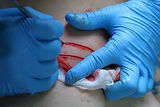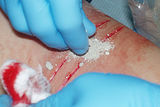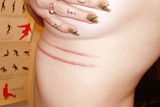Ash Rubbing
Jump to navigation
Jump to search
After a cutting is performed, there are a number of options as to how to treat it (if at all) to obtain different sorts of scars. One option that's similar to ink rubbing is to rub ashes into the fresh wound. This is done for a number of reasons:
- It irritates the wound and increases the amount of scarring.
- It may discolor the wound in a way similar to an ink rubbing.
- It allows items of emotional significance (for example, the cremation ashes of a loved one) to be integrated into one's own body.
It should be noted that the discoloration offered by ash rubbing is inconsistent and will not result in a uniform appearance.
Please note that the introduction of any foreign body into a wound increases the risk of infection. Ash is incompletely combusted wood - essentially carbon with a monoxide outer layer. Several recent papers have suggested that such substances are carcinogenic (cause cancer).


